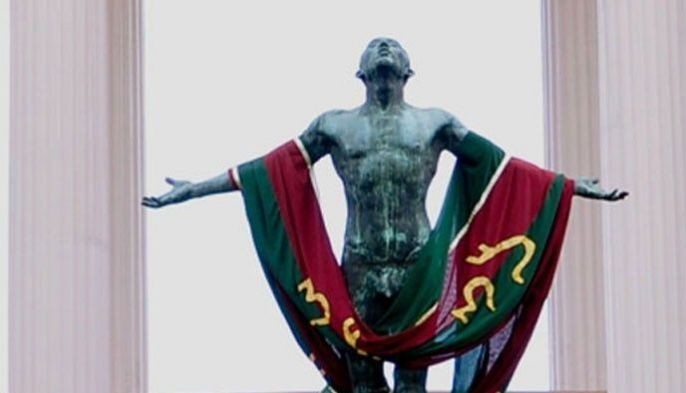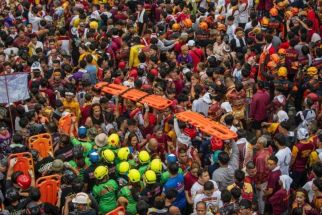House committee okays Charter changes
September 6, 2006 | 12:00am
The House committee on constitutional amendments, in a meeting that took less than two hours, approved a package of Charter changes that would shift the country to the parliamentary system and abolish the Senate.
Voting 30-7, the committee chaired by Cagayan de Oro City Rep. Constantino Jaraula approved the proposed amendments contained in Resolution 1230 without debating on them in detail.
Jaraula told reporters that his panel would now prepare its report for submission to the committee on rules, which Majority Leader Prospero Nograles heads.
He said the report should be with Nograles later this week or early next week.
Reached for comment, the majority leader said the moment he receives the proposed amendments from the Jaraula committee, he would immediately schedule them for plenary debates.
"We can have the debates next week. Once we approve them by a majority vote, we will invite senators to a joint session to tackle the amendments. If they don’t show up, we will have to ratify the amendments by a three-fourths vote of the combined membership of the Senate and the House," he said.
He pointed out that the Constitution mandates that proposed amendments be approved by a three-fourths vote of all the members of Congress.
"It does not require that the Senate and the House should vote separately, and that each chamber should muster a three-fourths vote," he added.
The manner by which the Jaraula committee tackled and passed Resolution 1230 angered seven members of the minority who attended the meeting.
"This is one of the lowest points in the history of the House. The committee spent no more than a minute to discuss the substance of the proposed amendments. It’s a shame, it’s a disgrace," said Deputy Minority Leader Roilo Golez.
"We witnessed not a railroad but a bullet train driven by powerful hands," he said.
Party-list Rep. Loretta Ann Rosales, a member of the minority, said President Arroyo’s House allies "are now desperate in pushing for Cha-cha because they know they cannot get the support of the Senate."
"This exercise is a farce!" howled Gabriela Rep. Liza Maza, another minority member. She later told reporters that what the committee did was "hypersonic railroading of Cha-cha."
The proceedings were so quick that several of those who voted for and against the amendments were barred from explaining their votes.
Under the proposed amendments, the nation would shift to the parliamentary system upon the ratification of these recommended Charter changes.
There would be an interim parliament to be composed of the present members of the Senate and the House, plus Vice President Noli de Castro, who would preside over the election of an interim prime minister.
De Castro would become an ordinary MP (member of parliament). There is no vice president in a parliamentary system.
On the other hand, President Arroyo will continue to serve both as head of state and head of government with undiminished powers, except those she may delegate to the prime minister, until her term expires on June 30, 2010.
The proposed Charter changes do not fix the date of the next election. Under the present Constitution, such election should be held in May next year.
The draft amendments would empower the interim parliament to set the date of the next election, which would be for local officials and members of the regular parliament. The interim parliament would remain in existence until the regular parliament is elected.
This discretion on the part of the interim legislature has prompted some Liberal Party congressmen to warn the nation that the envisioned interim parliament could schedule the next election in 2010, effectively extending the term of its members by three years.
The scenario is equivalent to the no-el (no elections in 2007) recommendation of the defunct presidential consultative commission on Cha-cha.
Nograles said other proposed amendments, including those that Surigao del Sur Rep. Prospero Pichay Jr. is suggesting, could be taken up during the plenary deliberations on the Jaraula committee report.
In Resolution 1285, Pichay has come up with his own package of amendments. He has been soliciting signatures for his resolution.
Under his version of the rewritten Constitution, and unlike in the Jaraula committee version, both the Senate and the House would continue to exist in the transition to full parliamentary system in 2010.
Mrs. Arroyo would remain as head of government and head of state, while De Castro would continue discharging his duties as vice president.
Party-list representation would continue in the new legislature, the parliament. The Jaraula version scraps party-list representation.
Pichay’s amendments set the next elections for November next year.
Voting 30-7, the committee chaired by Cagayan de Oro City Rep. Constantino Jaraula approved the proposed amendments contained in Resolution 1230 without debating on them in detail.
Jaraula told reporters that his panel would now prepare its report for submission to the committee on rules, which Majority Leader Prospero Nograles heads.
He said the report should be with Nograles later this week or early next week.
Reached for comment, the majority leader said the moment he receives the proposed amendments from the Jaraula committee, he would immediately schedule them for plenary debates.
"We can have the debates next week. Once we approve them by a majority vote, we will invite senators to a joint session to tackle the amendments. If they don’t show up, we will have to ratify the amendments by a three-fourths vote of the combined membership of the Senate and the House," he said.
He pointed out that the Constitution mandates that proposed amendments be approved by a three-fourths vote of all the members of Congress.
"It does not require that the Senate and the House should vote separately, and that each chamber should muster a three-fourths vote," he added.
The manner by which the Jaraula committee tackled and passed Resolution 1230 angered seven members of the minority who attended the meeting.
"This is one of the lowest points in the history of the House. The committee spent no more than a minute to discuss the substance of the proposed amendments. It’s a shame, it’s a disgrace," said Deputy Minority Leader Roilo Golez.
"We witnessed not a railroad but a bullet train driven by powerful hands," he said.
Party-list Rep. Loretta Ann Rosales, a member of the minority, said President Arroyo’s House allies "are now desperate in pushing for Cha-cha because they know they cannot get the support of the Senate."
"This exercise is a farce!" howled Gabriela Rep. Liza Maza, another minority member. She later told reporters that what the committee did was "hypersonic railroading of Cha-cha."
The proceedings were so quick that several of those who voted for and against the amendments were barred from explaining their votes.
Under the proposed amendments, the nation would shift to the parliamentary system upon the ratification of these recommended Charter changes.
There would be an interim parliament to be composed of the present members of the Senate and the House, plus Vice President Noli de Castro, who would preside over the election of an interim prime minister.
De Castro would become an ordinary MP (member of parliament). There is no vice president in a parliamentary system.
On the other hand, President Arroyo will continue to serve both as head of state and head of government with undiminished powers, except those she may delegate to the prime minister, until her term expires on June 30, 2010.
The proposed Charter changes do not fix the date of the next election. Under the present Constitution, such election should be held in May next year.
The draft amendments would empower the interim parliament to set the date of the next election, which would be for local officials and members of the regular parliament. The interim parliament would remain in existence until the regular parliament is elected.
This discretion on the part of the interim legislature has prompted some Liberal Party congressmen to warn the nation that the envisioned interim parliament could schedule the next election in 2010, effectively extending the term of its members by three years.
The scenario is equivalent to the no-el (no elections in 2007) recommendation of the defunct presidential consultative commission on Cha-cha.
Nograles said other proposed amendments, including those that Surigao del Sur Rep. Prospero Pichay Jr. is suggesting, could be taken up during the plenary deliberations on the Jaraula committee report.
In Resolution 1285, Pichay has come up with his own package of amendments. He has been soliciting signatures for his resolution.
Under his version of the rewritten Constitution, and unlike in the Jaraula committee version, both the Senate and the House would continue to exist in the transition to full parliamentary system in 2010.
Mrs. Arroyo would remain as head of government and head of state, while De Castro would continue discharging his duties as vice president.
Party-list representation would continue in the new legislature, the parliament. The Jaraula version scraps party-list representation.
Pichay’s amendments set the next elections for November next year.
BrandSpace Articles
<
>
- Latest
- Trending
Trending
Latest
Trending
Latest
Recommended





























